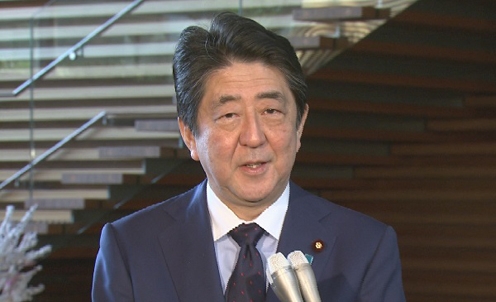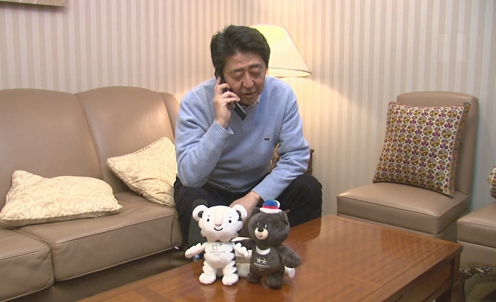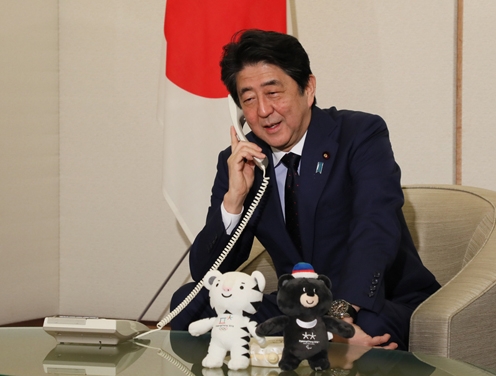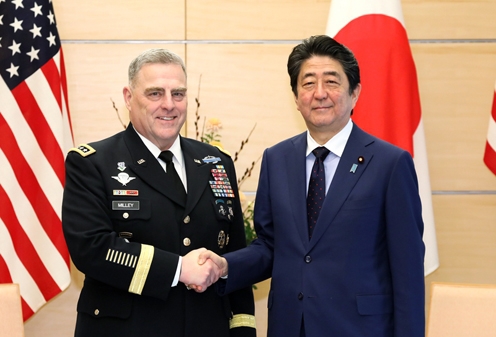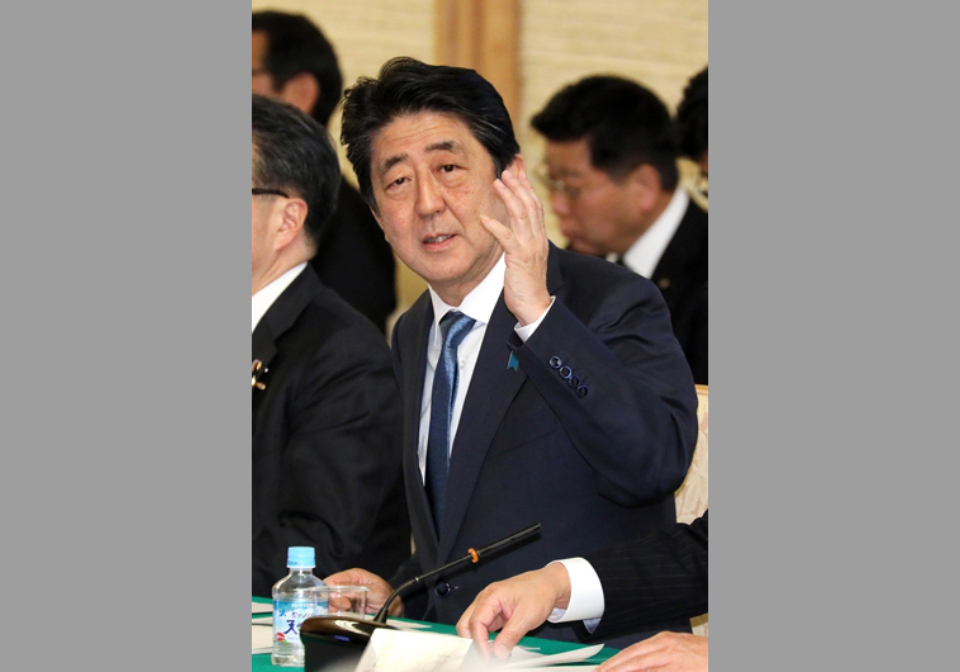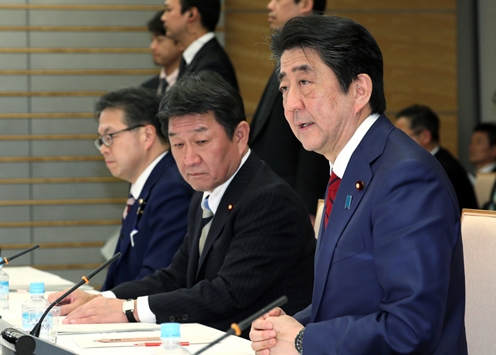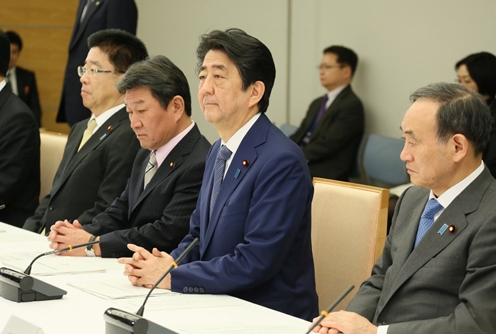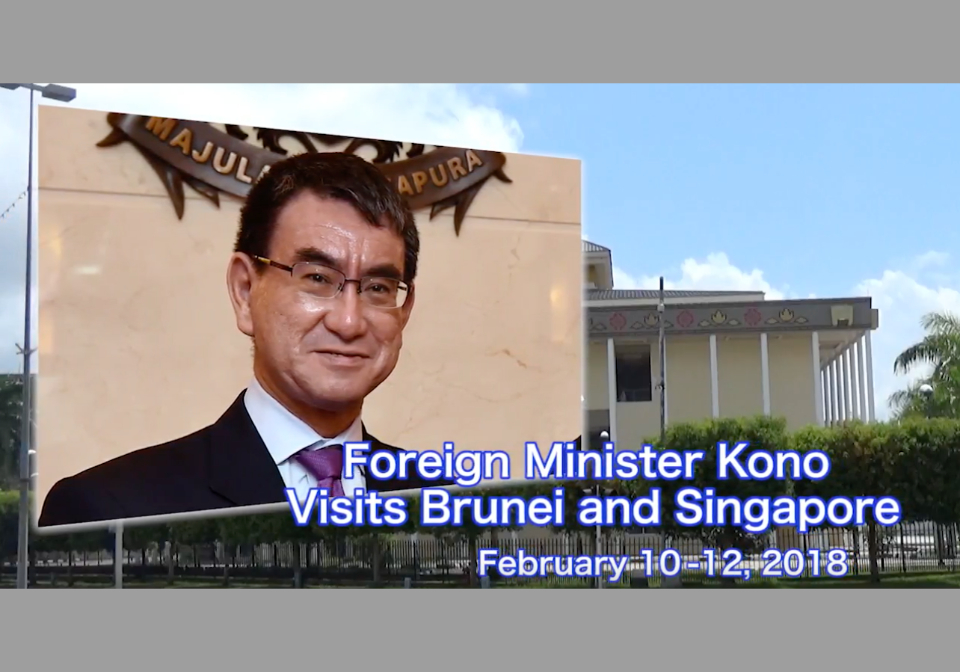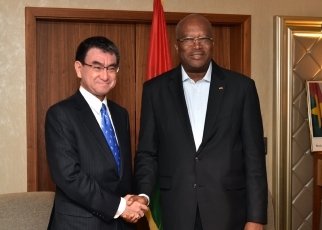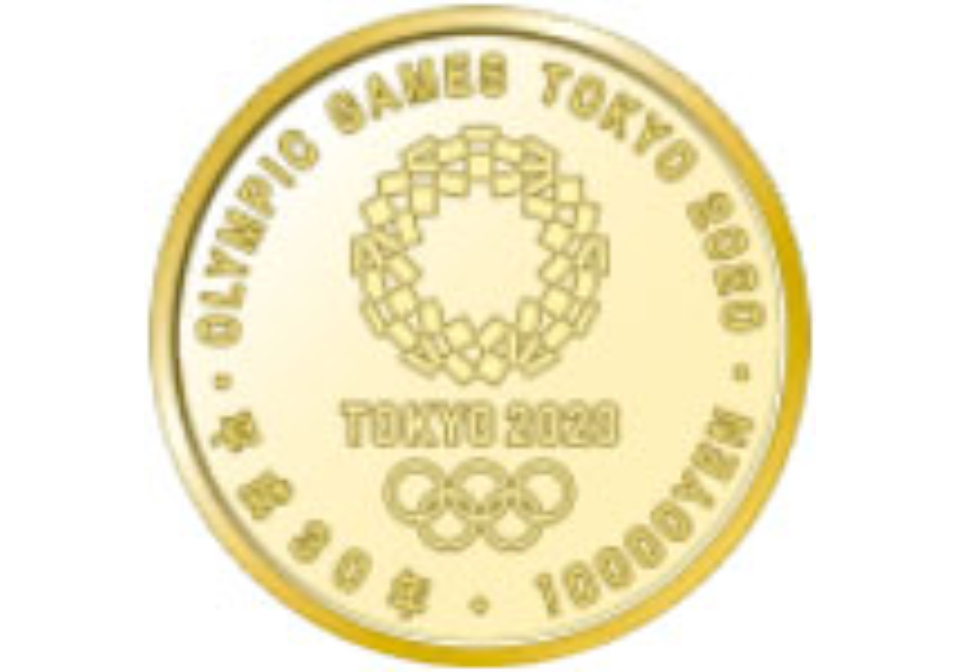Press Occasion on the Winning of Gold Medals by Figure Skater Yuzuru Hanyu and Speed Skater Nao Kodaira at the PyeongChang Olympic Games
Cabinet Secretariat, Monday, February 19, 2018
[Provisional Translation]
On February 19, 2018, Prime Minister Shinzo Abe held a press occasion at the Prime Minister’s Office.
In regard to the winning of gold medals by figure skater Mr. Yuzuru Hanyu and speed skater Ms. Nao Kodaira at the 23rd Olympic Winter Games, the Prime Minister said,
“Congratulations to Mr. Hanyu and Ms. Kodaira. What an exciting and moving weekend we had. The Japanese athletes have been truly impressive, and I believe this will become an unforgettable Olympic Games for us. We can expect even more medals in the second half of the Games. I will ensure that this momentum will carry on to the Tokyo Olympic Games.”
Congratulatory Telephone Call to Figure Skater Yuzuru Hanyu
Cabinet Secretariat, Saturday, February 17, 2018
[Provisional Translation]
On February 17, 2018, Prime Minister Shinzo Abe made a congratulatory telephone call to figure skater Mr. Yuzuru Hanyu, who won the gold medal in men’s figure skating at the PyeongChang Olympic Games.
In his congratulatory telephone call, the Prime Minister said,
“All the people of Japan are truly excited and moved by your performance. By overcoming such a serious injury you have created a new legend.”
“You have again overcome many adversities and given courage to countless people. The international media has given you large coverage, referring to you as ‘Ice Prince.’ As a fellow Japanese I feel very proud.”
Congratulatory Telephone Call to Speed Skater Nao Kodaira
Cabinet Secretariat, Monday, February 19, 2018
[Provisional Translation]
On February 19, 2018, Prime Minister Shinzo Abe made a congratulatory telephone call to speed skater Ms. Nao Kodaira, who won the gold medal in women’s 500-meter speed skating at the PyeongChang Olympic Games.
In his congratulatory telephone call, the Prime Minister said,
“Congratulations, Ms. Kodaira. I was watching at home the whole time yesterday. You skated boldly and magnificently. It was moving to see that the efforts you have put in over the past four years have paid off.”
“You have won the first gold medal for Japan in women’s speed skating, and as the captain of the Japanese team. It is a truly encouraging feat for everyone. I have my hopes up that Japan will win even more medals at the Games. After the race finished, you were talking to speed skater Lee Sang-hwa. What were you both talking about?”
“It was truly wonderful to see the two of you hugging and congratulating each other after the race. In the past four years you must have had various experiences, and you have also received support from many people. Please take care of yourself and continue to do your best going forward.”
“Once again, my heartfelt congratulations to you.”
Courtesy Call from the Chief of Staff of the U.S. Army
Cabinet Secretariat, Monday, February 19, 2018
[Provisional Translation]
On February 19, 2018, Prime Minister Shinzo Abe received a courtesy call from General Mark A. Milley, Chief of Staff of the U.S. Army, at the Prime Minister’s Office.
Council on the Promotion of the National Movement to Improve Productivity
Cabinet Secretariat, Thursday, February 15, 2018
[Provisional Translation]
On February 15, 2018, Prime Minister Shinzo Abe held a meeting of the Council on the Promotion of the National Movement to Improve Productivity at the Prime Minister’s Office.
At the meeting, reports were given on initiatives of the business groups from various sectors.
The Prime Minister said in his opening address,
“Today, we have asked the representatives of business groups as well as the top management who are kept busy with the day-to-day operations of their companies to gather here from every corner of Japan with the aim of improving productivity through all-Japan efforts.
Thanks to five years of Abenomics, Japan’s economy has achieved positive growth for eight consecutive quarters for the first time in 28 years. The economy’s positive cycle has begun to steadily set into motion due to four straight years of rising wages, and we are definitely moving along the path to the exit from deflation with the achievement of powerful economic growth led by private demand.
As a result, the supply-demand gap has been closed and is currently positive. Small- and medium sized enterprises (SMEs) and small businesses are faced with serious personnel shortages.
The greatest issues facing the Japanese economy today are eliminating labor shortages, improving productivity, and increasing the potential growth rate. We will implement various measures to resolve labor shortages from various angles, but they will be fundamentally rooted in improving productivity. The key to improving productivity is human resources development. I believe firmly advancing human resources development will increase the quality of individual personnel and contribute to increasing the potential growth rate.
We will confront the national challenge of a rapidly progressing declining birthrate and aging population to create a society where everyone naturally strives to fulfill their dreams.
The Abe administration will work to ensure that the wave of economic recovery reaches every corner of Japan by improving productivity. I ask for your cooperation in this regard.”
In addition, based on the day’s reports, the Prime Minister said in his concluding remarks,
“I would like to express my deep gratitude to the representatives of business groups and top management in attendance today, who have reported on the status of your initiatives to increase productivity, for coming from across Japan despite your busy schedules.
I had an opportunity to hear firsthand about the steady efforts you have been making toward improving productivity since setting up this Council last year, in the restaurant, accommodation, road freight, nursing care, and retail sectors. I feel very reassured by your presentations.
I also sensed strong ambition from those joining us for the first time from the construction, healthcare, environmental health, learning support, and agricultural sectors with regard to the activities that will be implemented.
As prime minister, I attend various meetings; I can say participating in this council meeting makes me feel very excited. This is not to say that other meetings do not excite me. While other meetings can also be exciting, this meeting truly makes me excited. This is because, as was the case today, presentations are given on the outcomes of the initiatives to date, showing us that concrete and therefore easy-to-understand initiatives are carried out and deliver results. Furthermore, we heard the good news that the participants will take advantage of these results to increase employee bonuses. Indeed visible results are being achieved. It is like watching the television broadcast of the PyeongChang Olympics and seeing gold, silver, and bronze medals being handed out one after another. While Japan has yet to have a gold medalist in the Games, I have high expectations for this weekend. In this manner, I hope that we will continue to see many more new medalists.
I gather that many of the industries represented today are some of the most closely intertwined with the lives of the people. These industries have spread to every corner of Japan. I believe there are opportunities that can be seized in which if you succeed in improving productivity, all areas of Japan will achieve steady economic growth without a doubt.
In Japan, the population is now declining. Meanwhile, the economy is performing well and the ratio of active job openings to applicants is at its highest level in 43 years. Also, the fourth industrial revolution is advancing, including IoT, AI, and robots. In other words, all the conditions are present for a greater revolution in productivity. It means if we do not achieve productivity improvements now, there may not be a future for Japan or all of you.
I look forward to working together with you on improving productivity as a national movement to jointly help pave the way for your future, your tomorrow, and the tomorrow of Japan. Thank you very much.”
Meeting of the Council on Economic and Fiscal Policy
Cabinet Secretariat, Tuesday, February 20, 2018
[Provisional Translation]
On February 20, 2018, Prime Minister Shinzo Abe held the 2nd meeting in 2018 of the Council on Economic and Fiscal Policy at the Prime Minister’s Office.
At the meeting, there were intensive deliberations over monetary policy, commodity prices, and other issues, followed by discussions on the management of the economy before and after the 2020 Tokyo Olympic and Paralympic Games, and the foreign labor force.
Based on the discussions, the Prime Minister said,
“Firstly, we held intensive deliberations over monetary policy, commodity prices, and other issues.
This was followed by discussions on the management of the Japanese economy before and after the 2020 Tokyo Olympic and Paralympic Games.
We heard the views of the private-sector members, including the importance of overcoming fluctuations in demand caused by the consumption tax increase and the hosting of the Olympic and Paralympic Games, and placing the Japanese economy on a stable growth trajectory.
In light of the experience of the consumption tax increase in 2014, and drawing lessons from cases in Europe, we need to control economic swings such as last-minute surge in demand and reactionary decline brought about by the consumption tax increase, and the Government must work together to consider concrete policies for leveling the fluctuations in demand. I ask for the cooperation of the relevant ministers in these efforts.
Secondly, we held discussions on the foreign labor force.
The Abe Cabinet has no intention of implementing so-called ‘immigration policies.’ We stand firm on this point. Meanwhile, while the ratio of active job openings to applicants has reached its highest level in 43 years as a result of five years of Abenomics, companies including small- and medium sized enterprises (SMEs) and small business are faced with serious personnel shortages.
To improve productivity and the working environment for women and the elderly, we need to promote revolutions in productivity and human resources development, along with work style reform, and swiftly examine our systems for accepting foreign personnel with specialized and technical skills.
By establishing a maximum residency period and a precondition not to permit family members to accompany the foreign personnel in principle, we will conduct a detailed study of system reform while focusing on sectors with a genuine need of labor, with the aim of presenting a direction by this summer. I would like to ask Chief Cabinet Secretary Suga and Minister of Justice Kamikawa to commence the study urgently with the cooperation of the relevant ministries overseeing the respective sectors.”
Ministerial Council on the Monthly Economic Report and Other Relative Issues
Cabinet Secretariat, Wednesday, February 21, 2018
[Provisional Translation]
On February 21, 2018, Prime Minister Shinzo Abe attended a meeting of the Ministerial Council on the Monthly Economic Report and Other Relative Issues at the Prime Minister’s Office.
Regarding the assessment of the current state of the Japanese economy, the February Monthly Economic Report states, “The Japanese economy is recovering at a moderate pace.”
Furthermore, in regard to short-term prospects, the Report states, “The economy is expected to continue recovering, supported by the effects of the policies, while the employment and income situation is improving. However, attention should be given to the uncertainty in overseas economies and the effects of fluctuations in the financial and capital markets.”
Foreign Minister Kono’s interview with Channel News Asia (Singapore)
Foreign Affairs, Tuesday, February 20, 2018
Foreign Minister Kono delivered messages on North Korea issue, the Japan-China relations, the Japan-Singapore relations, as well as TPP in the interview with Channel News Asia (Singapore) on February 12. The interview was broadcasted on February 15.
Japan-EU Foreign Ministers' Telephone Talk
Foreign Affairs, Friday, February 16, 2018
On February 16 (local time), Mr. Taro Kono, Minister for Foreign Affairs, held a telephone talk with Ms. Federica Mogherini, the High Representative of the European Union for Foreign Affairs and Security Policy, Vice-President of the European Commission during his visit to Munich for Munich Security Conference. The overview of the talk is as follows.
1. Japan-EU Strategic Partnership Agreement (SPA)
(1) Minister Kono welcomed the agreement of the negotiation of the Strategic Partnership Agreement (SPA) to enhance the coordination between Japan and the EU, which share fundamental values. Minister Kono expressed his intention to cooperate with the High Representative Mogherini toward early signing and entry into force of the SPA and Economic Partnership Agreement (EPA).
(2) High Representative Mogherini appreciated recent developments of the EU-Japan relationship and expressed her intention to pursue early signing and entry into force of the SPA and EPA.
2. North Korea
(1) Minister Kono pointed out that North Korea continues its nuclear and missile development and international society should not be blinded by its "charm offensive". Minister Kono emphasized the importance to firmly uphold policies of maximizing pressure on North Korea such as fully implementing the UN Security Council Resolutions. Minister Kono expressed his intention to cooperate closely with the EU.
(2) The High Representative Mogherini referred to the discussions held on the situation of North Korea at the EU informal meeting of Foreign Affairs Ministers and expressed that the EU will continue to maintain pressure on North Korea and coordinate firmly with Japan.
Foreign Minister Kono Pays a Courtesy Call on the President of Burkina Faso
Foreign Affairs, Friday, February 16, 2018
On Friday, 16 February from 18:03 local time, for approximately 25 minutes, H.E. Mr. Taro Kono, Minister for Foreign Affairs, paid a courtesy call on H.E. Mr. Roch Marc Christian Kaboré, President of Burkina Faso, during his visit to Munich, Germany, to participate in Munich Security Conference. The overview is as follows.
1. At the beginning, Minister Kono paid respect for President Kaboré’s leadership in promoting Burkina Faso’s economic development and stability. He also stated that Japan has decided to provide humanitarian and development assistance of 2 million dollars via international organizations to support Burkina Faso’s efforts to achieve stability in the Sahel region. In response, President Kaboré thanked Minister Kono and expressed his expectation for Japan’s continued support in agriculture, education and security sectors.
2. Minister Kono expressed his strong wish for President Kaboré participation in TICAD 7, which is to be held in 2019 in Yokohama. President Kaboré stated that he was willing to make a visit to Japan as early as in 2018 at a mutually convenient timing. Mr. Kono expressed his willingness to make an opportunity to introduce Burkina Faso to Japanese companies, when such a visit is realized.
3. Minister Kono also expressed his appreciation for Burkina Faso’s trade ban with North Korea announced in December last year. Minister Kono stressed that it is important to submit a report on the implementation of the relevant United Nations Security Council resolutions, which President Kaboré concurred.
4. In addition, President Kaboré and Minister Kono exchanged views on regional affairs and mutual cooperation in the international arena, including UN Security Council reform.
Press Conference by Foreign Minister Taro Kono
Foreign Affairs, Tuesday, February 20, 2018
The Meeting of the Advisory Panel on Climate Change
Reporter: Yesterday, you received recommendations from the Advisory Panel on Climate Change. They included content saying that Japan, which engages in diplomacy for renewable energy, should take the lead. Please tell us what kind of diplomacy you will improve in response to this.
Mr. Taro Kono, Minister for Foreign Affairs: We asked the experts to make recommendations taking into account the latest international trends and based on a wide range of data, and these very busy people gathered together once every week and compiled recommendations about energy at quite a fast pace.
A variety of discussions will be held within the government departments from now on, but I intend to use the recommendations for reference. And climate change has become a major issue that is truly being addressed in a variety of situations internationally. I also intend to incorporate this perspective in Japan’s diplomacy in a firm manner.
I am told that in April we will receive the recommendations about all aspects of climate change in April, so I am looking forward to that as well.
Foreign Minister’s visit to foreign countries
Reporter: You often say the number of countries visited by the foreign ministers of Japan and China is overwhelmingly different. Please tell us to what extent the fact that you are forced to be present in the Diet of Japan for long periods of time has a negative effect on the diplomacy of Japan.
Minister Kono: What I often say is that while my predecessor Foreign Minister Kishida and I have visited 110 countries over the past five years, China’s Foreign Minister Wang Yi has visited approximately 270 countries, and I think leaving this gap is undesirable. However, Japan and China have different political systems, so we should not fully compare them as if they were the same. I intend to consider a variety of effective and efficient ways to conduct visits to foreign countries.
Reporter: If there have been any cases in which the Diet actually had an effect on your overseas visits, could you tell us about them?
Minister Kono: It is also important to properly explain Japan’s diplomacy in the Diet, so I intend to carry out the diplomacy thoroughly while also explaining about it in the Diet and moving Japan’s diplomacy forward.
Reporter: Are you thinking that you will lobby the Diet and the Diet Affairs Committee?
Minister Kono: Japan’s diplomacy, unlike previously, is not number one in the world in ODA, and I think that in the context that China’s economic strength is growing and the economies of a variety of emerging countries are getting larger, we will be probably be pressed to adopt an approach to diplomacy that is a little different to before. In this context, as the person in charge at the Ministry of Foreign Affairs, I want to think carefully about how we can conduct Japan’s diplomacy effectively and efficiently.
Reporter: Regarding the fact that there is quite a difference in the number of visits compared to China, what do you think are the specific obstacles, or perhaps I should say barriers?
Minister Kono: I think that in meetings such as ASEAN and APEC, when compiling chairman’s statements or joint declarations of course the differences of a variety of effects emerge. I also think the reality is that the foreign ministers’ meeting with Greece recently was the first for more than 20 years, and naturally if there has been no foreign ministers’ meeting for 20 years, the relations between the two countries will not become stronger. In that sense I intend to work hard to ensure that I can respond thoroughly.
U.S. Army helicopter exercises off the coast of Hatsukaichi City, Hiroshima Prefecture
Reporter: Yesterday, off the coast of Hatsukaichi City, Hiroshima Prefecture, U.S. Army helicopters conducted exercises such as low-altitude flying and the local government demanded an explanation from the Government of Japan. Have you heard anything about this?
Minister Kono: Yes, there is nothing wrong.
Reporter: If there are any protests from the local government, will the Government of Japan provide an explanation about what happened?
Minister Kono: I think that should go without saying.
Munich Security Conference
Reporter: In Munich, you said in a session about the nuclear development of North Korea that the North’s motivation for the nuclear development is to achieve its ambition of reunifying North and South Korea. Is it acceptable to conclude that this is the view of the Government of Japan regarding the motivation for nuclear development of North Korea? I ask because it is often said that their motivation is to preserve their political system.
Minister Kono: I have been saying that it is to protect their regime, but North Korea has mentioned the reunification of North and South Korea in a variety of situations, so naturally I think it is carrying out the nuclear development with that ambition.
Reporter: Commander Harris of the U.S. Forces also expressed a similar view last week, so can we conclude that this is a point of view that has been coordinated by Japan and the United States?
Minister Kono: I think that looking at the nature of the statements by North Korea and the media reports, it is natural to reach this kind of conclusion.
Advisory Panel on Climate Change
Reporter: Returning to the first topic of climate change, some parts of the recommendations are a little different from the policy of the government, for example the statement that the approach of using nuclear power base load power source is an approach of the past, or that nuclear power is not competitive because it is high-risk. How do you respond to this?
Minister Kono: The experts are freely holding discussions taking into account current international trends and a wide range of data, so I think it is perfectly natural that their views are the not the same as those of the government in every detail.
Reporter: Will you ensure that the recommendations of the experts are utilized, including even the parts that are different from the government?
Minister Kono: I intend to use the recommendations as a reference for the discussions within the government.
New Tax Convention with Spain Agreed in Principle
Ministry of Finance, Wednesday, February 21, 2018
[Provisional translation]
1. The Government of Japan and the Government of the Kingdom of Spain have agreed in principle on the new Convention replacing the existing Tax Convention (the Convention between Japan and the Spanish State for the Avoidance of Double Taxation with respect to Taxes on Income), which entered into force in 1974.
2. The new Convention will reinforce or introduce provisions for clarifying the scope of taxation in the two countries, eliminating international double taxation and preventing tax evasion and avoidance and is expected to promote further mutual investments and economic exchanges between the two countries.
3. The new Convention will be signed after the necessary internal procedures have been completed by each of the two Governments. Thereafter, the new Convention will enter into force after the completion of the approval process in both countries (in the case of Japan, approval by the Diet is necessary).
Issurance of panel report on “Korea - Import bans, and testing and certification requirements for radionuclides” in the WTO Dispute Settlement Proceedings
Foreign Affairs, Friday, February 23, 2018
1. On February 22 (same day local time), the World Trade Organization (WTO) issued a panel report on “Korea – Import bans, and testing and certification requirements for radionuclides” in which Japan had filed its complaints against the Republic of Korea. The panel report finds that the Republic of Korea’s measures are inconsistent with the WTO Agreement and recommends the Republic of Korea to bring its measures into conformity with its obligations under the WTO Agreement.
2. Japan welcomes the panel’s findings and calls for the Republic of Korea to faithfully and promptly bring its WTO inconsistent measures into conformity with its WTO obligations under the WTO Agreement.
(Background Information)
(1) Following the Fukushima Dai-ichi Nuclear Power Plant accident in March 2011, the Republic of Korea introduced imports restriction measures on products imported from Japan including fishery products. In September 2013, the Republic of Korea adopted additional restriction measures; (i) an import ban on all fishery products from eight prefectures and (ii) extending the requirements for additional radionuclides testing to all Japanese food products including fishery products.
eight prefectures: Aomori, Chiba, Fukushima, Gunma, Ibaraki, Iwate, Miyagi and Tochigi
(2) Considering these measures could be inconsistent with obligations under the WTO Agreement, in May 2015, Japan requested consultations with the Republic of Korea pursuant to the Understanding on Rules and Procedures Governing the Settlement of Disputes (DSU). Following the consultations in June 2015, Japan requested the establishment of a panel in August 2015. In September 2015, the Panel was established.
(3) Pursuant to relevant provisions of the DSU, a panel report shall be adopted at a Dispute Settlement Body meeting within 60 days after the date of circulation of the report to the Members and its findings become fixed, unless a party to the dispute appeals to the Appellate Body.
Designs of The Olympic and Paralympic Games Tokyo 2020 Commemorative Coin Program (First Issue)
Ministry of Finance, Friday, February 23, 2018
The Ministry of Finance has decided to issue approx. 30 types of coins commemorating the Olympic and Paralympic Games Tokyo 2020 in four series before the opening of the Tokyo 2020 Games. For the first issue, the designs were decided as follows for a 10,000-yen premium-grade gold coin, two types of 1,000-yen premium-grade silver coin, and two types of 100-yen clad coin.

























